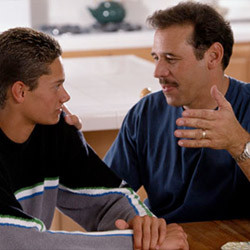 “It is common for siblings to blame themselves for causing the problem.”
“It is common for siblings to blame themselves for causing the problem.”When a teen is mentally struggling, it can be difficult to explain the situation to siblings. Unfortunately, if you conceal the problem, they may imagine all sorts of things. Kids know when something is wrong and they deserve to know what is happening.
Depending upon the age of the child, you can give more or less information. Keep in mind that your child will be listening not only to your words, but also to your tone. They will make note of your body language. It’s important to appear in control of the situation. Answer questions honestly and admit if you do not know something. Be prudent about the details you provide. Your youngsters do not need to know that their brother has been cutting; they do need to know that he is angry or depressed and is being treated by professionals.
It is common for siblings to blame themselves for causing the problem. A sibling may say that they pestered their older brother too much and drove him to depression. Expect this possibility and be prepared to explain that this is not the case. If you think it appropriate and fitting, you can say that you initially blamed yourself too, but that now you know it is a sickness.
I recommend that you tell your child that this is a family matter and that if anyone asks him what is wrong with their sibling to simply say that he or she isn’t feeling well. If they are pressed for more information, they should should refer the person to you.
It is easy to exert all your time and energy on a sick child. Sometimes the sibling feels neglected and will begin acting out; for example, experimenting with drugs. Keep in mind the need for family balance. You will not help your depressed teen by neglecting yourself and everyone else in the family. You may, in fact, prolong the illness if you make it the central part of the family. Sometimes a teen will hold onto an illness if they are getting special attention. Bring home a puzzle and a pizza for your younger children after you have visited your older child in the hospital, or take them to the zoo on Saturday. Establishing a sense of normalcy wherever you can will help everybody, including you.
Handling Sibling Resentment
Your other children may resent their ill sibling for the trouble it may seem to be causing the family. It can be helpful to find a brief, written summary of your teen’s illness. A paragraph or two should be enough; try a website such as NAMI’s Mental Health Conditions. Explain before you hand it to the child that your teen’s illness is medical in nature, even though the symptoms are behavior-based.
If your child remains resentful, ask, “How is this affecting you?” Make sure you understand by rephrasing what you hear and asking if you’ve got it right. Do not argue, explain, or defend. Just listen. Encourage your child to say more because often the good stuff is buried and comes later. Say things like, “I’d like to hear more about that.” When you think your child has told you everything, ask, “Is there anything more?” You can also ask what would help to improve matters. Afterward, thank your child for explaining and say that their feelings matter greatly to you. Avoid making promises at this point. Instead, ask for some time to think about what you’ve heard. Give yourself a day to mull it over and try to see things from the sibling’s point of view. Discuss solutions with your spouse. Then address the matter with your child as soon as possible, preferably within a day or two.
Overloading Siblings With Responsibility
I’ll never forget a chilling scene I witnessed at a family therapy session in the hospital. A large family entered the room, including the twin brother of a teen who had just been admitted for a suicide attempt. Everyone seemed worried, especially the brother of the teen. He told us that he wanted to do everything he could to help his brother. His dad pointed out that since he was closer to his brother than anyone, he would play a key role in his recovery. Then the aunt and uncle took turns voicing their encouragement to the boy, the uncle concluding with, “It’s up to you Ryan. You’re going to have to be the one who saves him.”
The boy’s eyes grew huge with fear. It was too much responsibility for a teenager. The therapist came to the rescue and pointed out that the boy’s top priority should be maintaining his schoolwork and his own mental health, and that “saving” his brother should be a priority for the adult family members and the hired professionals.
My husband and I had to resist the temptation to rely on our teenage son when our second child was hospitalized for depression and suicide ideation. Our son had been in the hospital for depression before and we knew he could offer us some insight. On several occasions, we did ask for his opinion and he helped us, but we always let him know that we were the ones responsible for taking care of his sister. (Just a side note: sometimes a sibling sees things that none of the adults do, so when they speak up, listen.)
Holding your family together can feel tricky at a time like this. Just remember that kids are resilient and forgiving. You’re allowed to make mistakes. Apologize, forgive yourself, and move on.
Tags: Caregivers, Family Issues